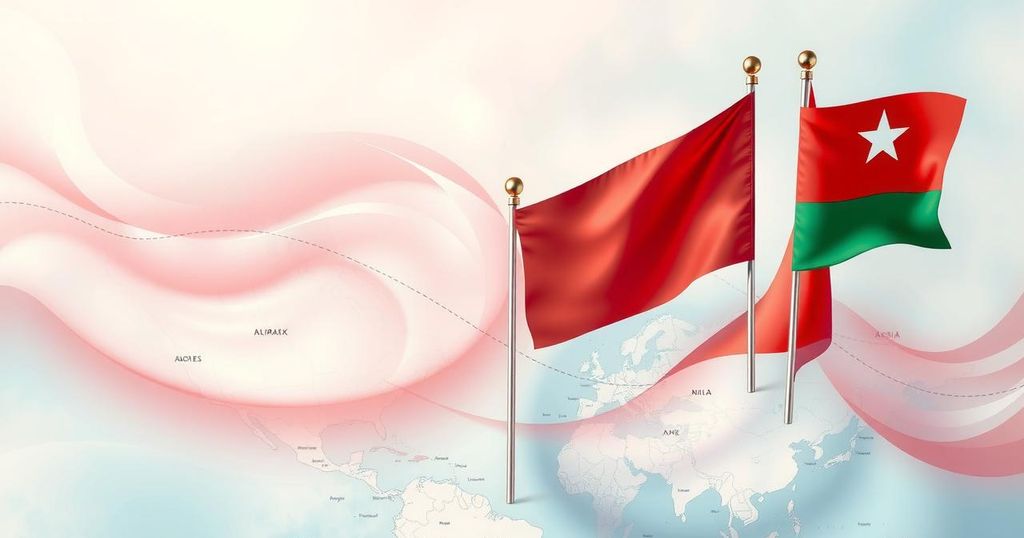Rubio Addresses Gaza and Syria Situation in Senate Hearing
U.S. Secretary of State Marco Rubio addressed the Senate on Gaza, Syria, and Iran, clarifying that deportation of Gazans to Libya is not under discussion. He noted food shipments to Gaza have restarted, though aid distribution remains stalled. Rubio emphasized the urgency for U.S. cooperation with Syria’s new government amid potential challenges and warned of civil war risks.
United States Secretary of State Marco Rubio recently attended a Senate Foreign Relations Committee hearing, where he addressed various pressing foreign affairs topics, including the situation in Gaza and Syria, discussions about a potential nuclear deal with Iran, and foreign aid. Notably, Rubio made clear that deportation of Gazans to Libya had not been part of U.S. discussions. Instead, the focus is on exploring options for Gazans who wish to voluntarily leave the enclave.
Rubio said, “What we have talked to some nations about is if someone voluntarily and willingly says I want to go somewhere else for some period of time because I’m sick, because my children need to go to school, or what have you, are there countries in the region willing to accept them for some period of time?” However, he did not mention Libya as a potential destination during the talks.
On a more positive note, the Secretary highlighted that food shipments to Gaza have resumed. According to him, an additional 100 trucks are positioned to cross the border soon. While this news is hopeful, it’s worth noting that, as reported by UN spokesperson Stéphane Dujarric, no humanitarian aid has yet been distributed, despite the ongoing efforts to deliver supplies.
Rubio also provided insight into the ongoing negotiations regarding a nuclear deal with Iran. The aim is to reach an agreement that would enable Iran to pursue a civil nuclear energy program without uranium enrichment. As he stated, “It will not be easy, but that’s the process we’re engaged in now.” This reflects a complex diplomatic strategy to address Iran’s nuclear ambitions.
Turning to Syria, Rubio discussed the precarious state of the country and the potential consequences of the U.S. easing sanctions following President Trump’s recent interactions with Syrian President Ahmed al-Sharaa. He expressed the urgent need for collaboration with the Syrian government to stabilize the region. Rubio warned that the transitional authority in Syria is facing significant challenges, stating, “It is our assessment that, frankly, the transitional authority… is maybe weeks, not many months, away from potential collapse.”
Moreover, he reflected on the mixed composition of the new Syrian government, which includes diverse groups that historically coexisted but were divided by the Assad regime. Notably, Rubio pointed out Sharaa’s controversial background as someone previously associated with al-Qaeda and drew attention to the tough choices facing the U.S. administration regarding trust and cooperation with Syria’s new leadership.
Reports about Rubio’s remarks have gained traction, particularly his warning about Syria potentially descending into civil war. However, context matters; he emphasized that working with the new government is aligned with the Trump administration’s policy. The President’s unconventional approach to diplomacy may be seen in his support of Sharaa, who has backing from regional powers such as Saudi Arabia and Turkey.
Nevertheless, Rubio acknowledged significant challenges ahead. Domestically, the new Syrian government confronts dissent from various armed groups, including ISIS cells. The U.S. remains concerned about foreign militants and destabilizing influences within Syria. Furthermore, the Assad regime’s efforts at control are complicated by demands for demilitarization from Israel and the smuggling of weapons across borders.
In conclusion, Rubio’s comments during the hearing shed light on the complex dynamics in Gaza and Syria. The U.S. is navigating a delicate balance of supporting diplomatic solutions while grappling with domestic and regional challenges. His acknowledgment of the precarious situation in Syria highlights urgent requirements for stability, which could impact broader regional security.
In summary, Secretary of State Marco Rubio’s recent remarks provide crucial insights into the United States’ foreign policy approach regarding Gaza and Syria. His discussion indicates that while options for Gazans wishing to leave the enclave are being explored, there are significant challenges ahead for both Gaza and Syria. From navigating potential nuclear agreements with Iran to addressing the precarious governance in Syria, the need for effective diplomacy remains critical. Rubio’s insights point to a complex future that U.S. policymakers must carefully navigate.
Original Source: www.jpost.com




Post Comment